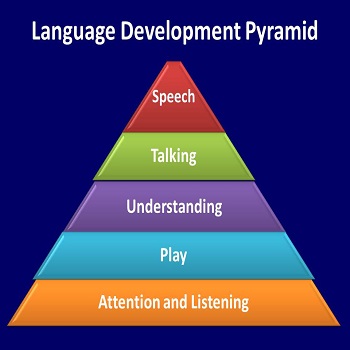
A lot of parents, carers and educators worry that children are not “talking” at a certain age. “Talking” in this particular context refers to the topmost part of the language pyramid called speech. Without understanding that speech and language develop in stages, parents, carers and educators may end up putting unnecessary pressure on themselves as well as the children in order to get them to “talk”. Whilst speech and language continues to be one of several indicators of other medical conditions, it is important to remember that speech and language difficulties can improve with the right support and children can catch up without an underlying medical condition being present. If we understand how speech and language develops, then we will be better positioned to know if there is something to worry about.
Attention and Listening: When babies are born, they first learn to listen before making sounds. This means they take in information using mainly their eyes and ears. Attention therefore involves being in a ready state to receive and absorb new information. Because this is such a critical step in the language development pyramid, if this skill is not properly developed in children, they are likely to struggle with other steps on the pyramid.
Play: You will often hear that children learn through play, this is true. Children learn lots about communication through playing with toys and people and so they need lots of opportunity to play. The play develops from exploratory play to functional play and then to imaginative play. More importantly, through play, children learn how to interact, take turns and share with other people.
Understanding: Further up the pyramid is understanding. This is where children learn to give meaning to new information that has been picked up. Particularly, this is the ability to understand what is being said or the instruction that is being given.
Talking: At this point, children start to use words. This will start from single words and then progress on to a combination of words. The words may not be absolutely clear but they can be deciphered.
Speech: This is the final stage where a child is able to make sentences which have meanings either to the child’s immediate family or to a wider audience.
How it all ties together: A child that has poorly developed attention and listening skills will struggle with taking in new information. If new information is not taken in fully, then full information cannot be processed. As a result, such child may struggle with fully understanding what things mean and be unable to act or provide an appropriate verbal response.
Remember, you are not required to give a diagnosis. Your focus should always be “how can I support this child better”.
Please look out for the next post (2 of 2) where I will be sharing strategies that can be used to improve each step on the pyramid.

